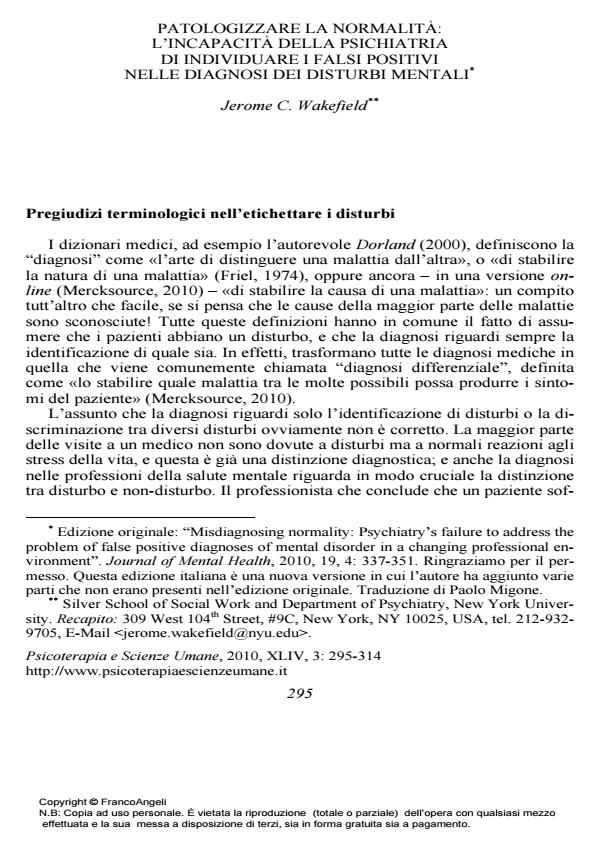Patologizzare la normalità: l’incapacità della psichiatria di individuare i falsi positivi nelle diagnosi dei disturbi mentali
Titolo Rivista PSICOTERAPIA E SCIENZE UMANE
Autori/Curatori Jerome C. Wakefield
Anno di pubblicazione 2010 Fascicolo 2010/3
Lingua Italiano Numero pagine 20 P. 295-314 Dimensione file 418 KB
DOI 10.3280/PU2010-003001
Il DOI è il codice a barre della proprietà intellettuale: per saperne di più
clicca qui
Qui sotto puoi vedere in anteprima la prima pagina di questo articolo.
Se questo articolo ti interessa, lo puoi acquistare (e scaricare in formato pdf) seguendo le facili indicazioni per acquistare il download credit. Acquista Download Credits per scaricare questo Articolo in formato PDF

FrancoAngeli è membro della Publishers International Linking Association, Inc (PILA)associazione indipendente e non profit per facilitare (attraverso i servizi tecnologici implementati da CrossRef.org) l’accesso degli studiosi ai contenuti digitali nelle pubblicazioni professionali e scientifiche
Quando la psichiatria si è trasformata da un’attività basata sul lavoro nei manicomi a una professione inserita nella comunità, le diagnosi false positive hanno rappresentato una vera sfida alla validità dei sistemi diagnostici. L’introduzione, col DSM-III del 1980, di criteri diagnosti operazionalizzati basati sui sintomi descrittivi ha esacerbato questa difficoltà a causa della natura contestuale della distinzione tra normale disagio e disturbo mentale. Viene discusso, anche con esempi clinici, se i DSM-III e DSM-IV sono riusciti a evitare i falsi positivi, e viene fatta un’analisi concettuale dei criteri di alcune diagnosi, proponendo contro-esempi alla pretesa dei DSM di identificare un disturbo. A tutt’oggi la psichiatria non è riuscita a risolvere il problema dei falsi positivi. Permangono lacune riconoscibili persino da non specialisti, e questo anche se il problema è puramente concettuale e non dipende da nuove informazioni provenienti da ricerche.
Parole chiave:Diagnosi psichiatrica, falsi positivi, validità dei criteri diagnostici, filosofia della psichiatria, significatività clinica
- Il processo diagnostico e relazionale in psichiatria. Validità epistemologica tra normalità e patologia Alfio Allò, in Ricerca Psicoanalitica /2021
DOI: 10.4081/rp.2021.277 - La psychiatrie et la santé mentale à l'épreuve du DSM Pierangelo Di Vittorio, in Déviance et Société /2014 pp.103
DOI: 10.3917/ds.381.0103
Jerome C. Wakefield, Patologizzare la normalità: l’incapacità della psichiatria di individuare i falsi positivi nelle diagnosi dei disturbi mentali in "PSICOTERAPIA E SCIENZE UMANE" 3/2010, pp 295-314, DOI: 10.3280/PU2010-003001